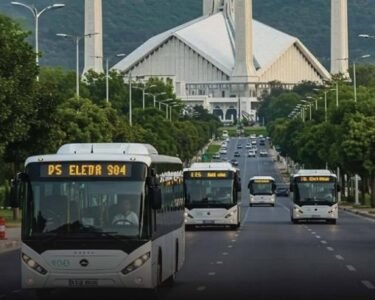The Sindh government has officially approved the procurement of 500 electric buses to serve the metropolitan cities of Karachi and Hyderabad, a transformative step toward building a clean, efficient, and sustainable public transport system in the province.
The decision was finalized during the 48th meeting of the Public-Private Partnership (PPP) Policy Board, chaired by Chief Minister Syed Murad Ali Shah at the CM House on Friday. The session was attended by key provincial ministers, the Chief Secretary, the Planning and Development Chairman, the Director General of the PPP Unit, and the Transport Secretary, among other senior officials.
The People’s Green Transport Project
The meeting granted formal approval to the People’s Green Transport Project, which aims to introduce a large fleet of electric buses through a public-private partnership (PPP) model. The board approved the project’s structure, scope, and risk-sharing framework, along with an amended proposal from a private firm that has been granted the right of first refusal and exemption from the prequalification process.
To attract additional investment, the PPP Board also authorized the solicitation of private partners for implementation.
Project Details and Impact
The initiative will roll out 500 electric buses in multiple phases, supported by essential infrastructure including depots, charging stations, bus shelters, and an automated fare collection and intelligent transport system. Operating under a 12-year concession period, the project is expected to serve over 200,000 passengers daily once fully deployed.
Integrated with Karachi’s Green Line Bus Rapid Transit (BRT) network, the new electric fleet aims to enhance connectivity, reduce air pollution, and decrease dependence on fossil fuels, contributing directly to Sindh’s environmental and urban mobility goals.
Toward a Sustainable Future
The Sindh PPP Policy Board described the approval as a landmark milestone in the province’s journey toward modern, sustainable, and inclusive transportation. By embracing clean energy solutions, the initiative aligns with Pakistan’s broader climate objectives and demonstrates the Sindh government’s commitment to green urban development.
With this project, Karachi and Hyderabad are poised to become models of eco-friendly mass transit, setting the stage for a cleaner, smarter, and more connected Sindh.






